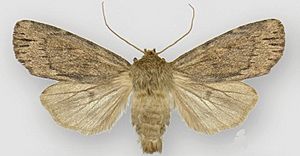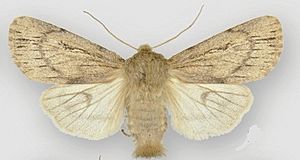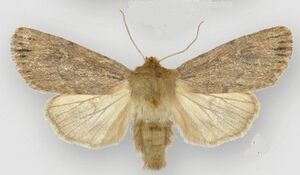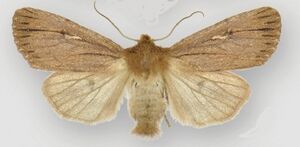Ufeus satyricus facts for kids
Quick facts for kids Ufeus satyricus |
|
|---|---|
 |
|
| Ufeus satyricus satyricus male | |
 |
|
| Ufeus satyricus satyricus female | |
| Scientific classification | |
| Kingdom: | |
| Phylum: | |
| Class: | |
| Order: | |
| Family: | |
| Genus: |
Ufeus
|
| Species: |
U. satyricus
|
| Binomial name | |
| Ufeus satyricus Grote, 1873
|
|
| Synonyms | |
|
|
The Ufeus satyricus is a type of moth that belongs to the Noctuidae family. These moths are found across central and southern Canada, stretching from the Atlantic Ocean all the way to the Pacific. They also live in parts of the United States, as far south as Pennsylvania and Illinois in the east, and down to southern Arizona and California in the west. You'll often find them where large poplar trees grow.
Contents
What They Look Like and When They Fly
The front wings of these moths are about 15 to 22 millimeters long for males. For females, their front wings are a bit longer, measuring 19 to 24 millimeters.
Adult moths come out of their pupae (a stage like a cocoon) during the summer. They then spend the winter as adults. You can often spot them from late August to early May. They are even seen flying during warmer days in the middle of winter! Most sightings happen in October and November in the fall, and in March and April in the spring.
What They Eat
The young moths, called larvae, have been seen eating cottonwood trees. These trees are an important food source for them as they grow.
Different Types of Ufeus satyricus
Just like some animals have different types or "subspecies," the Ufeus satyricus moth has two main ones. These are slightly different versions of the same moth, usually found in different areas.
Ufeus satyricus satyricus
This type of moth lives in eastern North America. You can find them all the way west to the foothills of the Rocky Mountains.
Ufeus satyricus sagittarius
This subspecies was named by Grote in 1883. It lives from the eastern edge of the Rocky Mountains. This includes places like Alberta, Montana, and Colorado. They can be found all the way to the Pacific Coast.
 | Tommie Smith |
 | Simone Manuel |
 | Shani Davis |
 | Simone Biles |
 | Alice Coachman |



